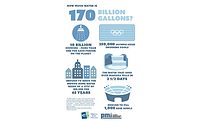Environmentalists Hoping Water-Efficient Toilets Catch On Soon
By this time, consumers are used to
seeing EnergyStar labels on big appliances such as refrigerators. Now it’s time
to start expecting similar efficiency labels for toilets.
The federal Environmental Protection
Agency actually rolled out its “WaterSense” labeling program a few years back,
said Derek Bennett, who manages the state environmental
department’s water use and conservation program.
The WaterSense label indicates that certain toilets - along with faucets - meet certifiable performance and efficiency standards.
Believe it or not, there are more than 500 tank toilets and 1,650 faucets on the market now carrying the WaterSense label, Bennett said, with certified urinals and shower heads expected to do the same this year.
Still, the drive to save water through such fixtures hasn’t seemed to catch on, say, like the coiled energy-efficient light bulbs. “I don’t think we’re there yet,” Bennett said.
And he isn’t entirely sure why, other than the theory that water generally isn’t like other commodities in regard to supply and demand. New Hampshire is considered “water rich,” Bennett said; the Granite State receives an average of 45 inches of precipitation a year.
“People don’t put water conservation to the forefront,” he said. “But just because that’s true doesn’t mean we shouldn’t conserve.”
Possibly - and unfortunately - it may take something major, such as a drought, for more people to buy in to water conservation through their bathroom purchases. The math, though, is pretty convincing.
Click here, to read more on this story from Karen Lovett at nashuatelegraph.com.
The WaterSense label indicates that certain toilets - along with faucets - meet certifiable performance and efficiency standards.
Believe it or not, there are more than 500 tank toilets and 1,650 faucets on the market now carrying the WaterSense label, Bennett said, with certified urinals and shower heads expected to do the same this year.
Still, the drive to save water through such fixtures hasn’t seemed to catch on, say, like the coiled energy-efficient light bulbs. “I don’t think we’re there yet,” Bennett said.
And he isn’t entirely sure why, other than the theory that water generally isn’t like other commodities in regard to supply and demand. New Hampshire is considered “water rich,” Bennett said; the Granite State receives an average of 45 inches of precipitation a year.
“People don’t put water conservation to the forefront,” he said. “But just because that’s true doesn’t mean we shouldn’t conserve.”
Possibly - and unfortunately - it may take something major, such as a drought, for more people to buy in to water conservation through their bathroom purchases. The math, though, is pretty convincing.
Click here, to read more on this story from Karen Lovett at nashuatelegraph.com.
Looking for a reprint of this article?
From high-res PDFs to custom plaques, order your copy today!






